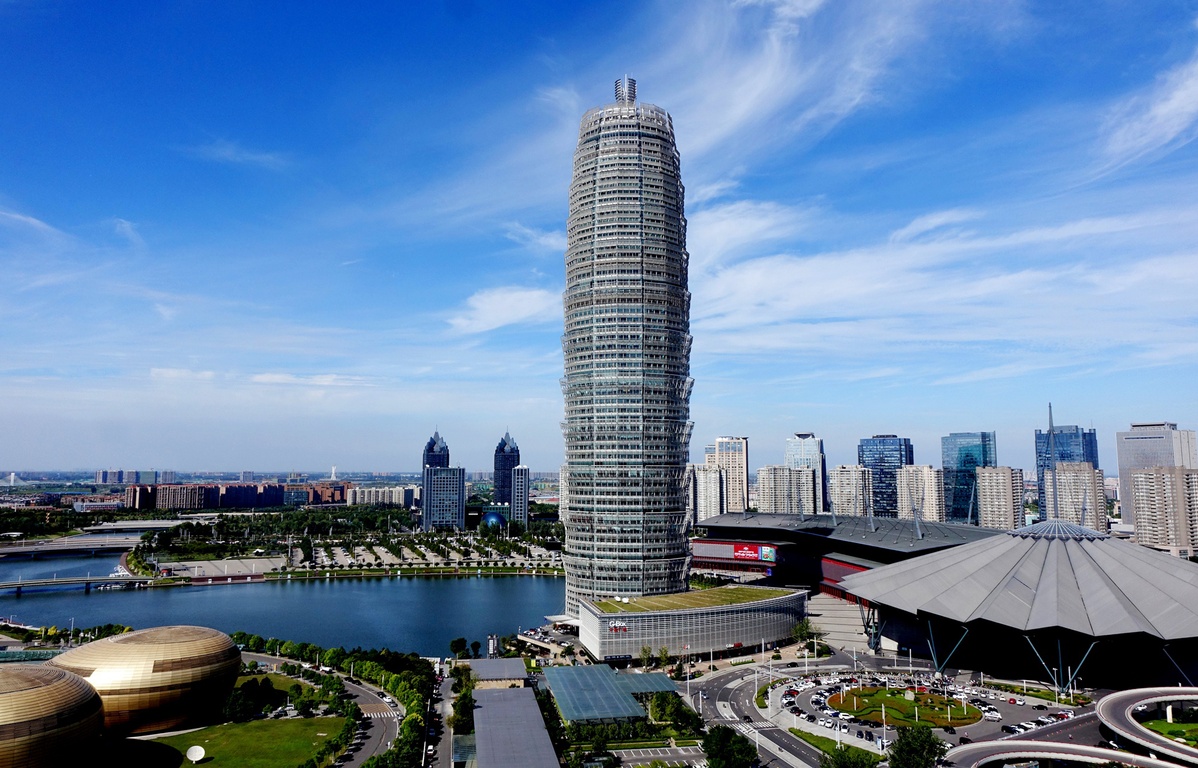Zhengzhou Striving to Manage Growth, Convenience

The Zhengdong New District in Zhengzhou, Henan province, with the Millennium Royal Plaza in the center. The 280-meter-tall building is inspired by the Songyue Pagoda, in the province's Songshan Mountain, which dates back to some 1,500 years and is China's oldest brick pagoda. CHINA DAILY
The city adheres to "people-centered" governance to ensure that citizens can live happier, better lives
Zhengzhou, capital of the central province of Henan and a National Central City-one of several charged with leading, developing and undertaking key economic, political and cultural tasks-not only stood up to the challenges posed by last year's COVID-19 outbreak, but also managed to keep development on the right track.
Last year, the city's GDP reached 1.2 trillion yuan ($187 billion), up 3 percent from 2019. The figure was 0.7 percentage points higher than the national average and 1.7 percentage points higher than the provincial average.
The Zhengzhou bureau of statistics attributed the robust growth under such difficult conditions to the municipal authorities' pertinent policies and the support of relevant growth drivers.
Last year, the municipal government rolled out 58 pro-growth and pro-employment policies, which benefited 376,000 businesses and created 2.75 million jobs. Moreover, in total, companies were exempted from paying 51.4 billion yuan in fees and taxes.
The policies laid a solid foundation to safeguard the city's economy in March last year, with six major industries as the main growth drivers.
Yu Xin'an, chairman of the Henan Zhongyuan Innovation Development Institute, said Zhengzhou's development over the past five years has been remarkable, especially after it was recognized by the central authorities as a National Central City.
"Zhengzhou's strength as a transportation hub in the country's high-speed railway system will become more dominant," Yu said.
"Implementation of the National Yellow River Strategy and the formation of the Central China City Cluster have also underlined Zhengzhou's role as a leading city in regional development. It will assume a bigger role in the country's efforts to form a new development paradigm by connecting the domestic and foreign markets."
Zhengzhou is also working with neighboring Kaifeng, Xinxiang, Jiaozuo and Xuchang-which form the backbone of the Central China City Cluster-to promote cooperation in science and technology and smart manufacturing. The city has signed a strategic cooperation agreement with Jinan, capital of Shandong province on the lower reaches of the Yellow River, to jointly protect the environment and traditional culture of the river basin and accelerate the economic development of cities along the waterway.
Zhengzhou is also aiming to use its hospitable and natural environment to become a regional growth engine in the Central China City Cluster and a destination for job-seekers, entrepreneurs and tourists.
In recent weeks, it has taken advantage of information technology to streamline administrative procedures for government-related affairs to make it more convenient for businesses and individuals to deal with the city authorities.
It has also improved its infrastructure facilities, modernized its appearance and improved general management systems.
In Zhengzhou, the construction and management of the city has always adhered to the concept of "people-centered" development. To ask its civil servants "Are urban management jobs being done well?" is equivalent to asking "Are the people satisfied?".
Li Xuesheng, chief of the Zhengzhou management bureau, said the city has improved greatly in many ways.
"The government always implements the people-centered principle and regards the people's satisfaction as the goal of its work, particularly in resolving problems directly related to their well-being," he said.
"The improvement in grassroots governance and the changes in lifestyles have laid the foundations for the city's development."
The city authorities believe that the fruits of good urban management should be visible, tangible and accessible to the people. Meanwhile, urban management should always employ the principle of joint construction, joint governance and shared benefits, so the bonuses of good governance can be shared by everyone.
The construction of intelligent urban management systems in the city is producing better regulated, more predictable procedures.
Zheng Zhanshi, a civil servant of the office that promotes garbage sorting, said residents are becoming more active in sorting their garbage as it becomes a common consensus that it is an "all-for-one and one-for-all" undertaking that will make their hometown cleaner and more habitable.
